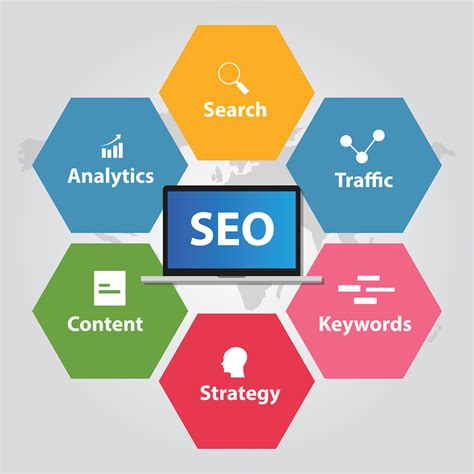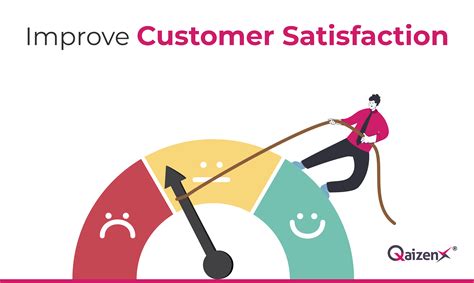Creating an impactful and successful online presence requires more than just having a website. It involves a careful optimization strategy that ensures your online platform is easily discoverable by search engines and attracts a larger audience. In the fiercely competitive digital world, standing out from the crowd and grabbing the attention of potential customers is crucial. To accomplish this, you need to implement efficient tactics to improve your website's search engine rankings and secure a prominent spot in the virtual arena.
Boosting your website's visibility isn't just about incorporating the right keywords. While keyword optimization is undeniably important, the search engine algorithms have evolved to consider numerous factors when ranking websites. These factors include the overall performance, user experience, and relevance of your site's content. With the ever-changing algorithms and the constant evolution of online marketing, a comprehensive approach is necessary to achieve sustainable and long-lasting results.
One of the first and most effective steps towards optimizing your website is ensuring an intuitive and user-friendly design. A well-structured website with easy navigation not only improves the user experience but also helps search engines crawl and understand your content better. Additionally, creating high-quality, engaging content that resonates with your target audience is essential. A well-crafted content strategy that showcases your expertise, encourages audience interaction, and answers their queries will not only draw more traffic but also enhance your site's credibility and authority in the eyes of search engines.
When it comes to optimization, never underestimate the power of backlinks. Building a strong network of authoritative websites that link back to your content reflects positively on your website's credibility and can significantly boost your search engine rankings. However, it's crucial to focus on obtaining quality backlinks from reputable and relevant sources rather than amassing a multitude of low-quality links. Remember, the quantity may matter, but quality is key!
Understanding the Significance of Search Engine Optimization (SEO)

In today's digital landscape, the positioning of your online presence plays a crucial role in determining the success of your business. Ensuring that your website ranks higher on search engine result pages (SERPs) is vital for attracting organic traffic, increasing visibility, and driving more conversions. This is where Search Engine Optimization (SEO) comes into the picture.
SEO encompasses a set of strategies and techniques that help improve your website's visibility, credibility, and relevance in the eyes of search engines. It involves optimizing various elements of your website, including its content, structure, and technical aspects, to ensure it aligns with search engine algorithms. By understanding and implementing effective SEO practices, you can increase the chances of your website being found by potential customers organically.
The importance of SEO cannot be overstated. In a highly competitive online landscape, businesses that prioritize SEO gain a significant advantage over their competitors. By investing in SEO, you can achieve higher search engine rankings, drive targeted traffic to your website, and ultimately boost your business's success. SEO is not just a one-time effort; it requires consistent monitoring, analysis, and refinement to stay ahead in the digital race.
When done right, SEO can help your website appear on the first page of search results, capturing the attention and interest of users who are actively searching for products or services like yours. This visibility not only increases brand awareness but also fosters trust among potential customers, as higher search rankings often signify credibility and authority.
Understanding the importance of SEO empowers you to make informed decisions about your website's optimization efforts. By incorporating effective SEO strategies into your overall digital marketing strategy, you can establish a strong online presence, improve user experience, and maximize your website's potential to attract and retain valuable customers.
Conducting Keyword Research to Drive Targeted Traffic
In order to attract the right audience to your website, it is crucial to conduct thorough keyword research. By understanding the words and phrases your target audience uses when searching for information, products, or services online, you can optimize your website to rank higher in search engine results and drive targeted traffic.
Identifying relevant keywords: Begin by brainstorming a list of potential keywords that are related to your industry, niche, or specific offerings. Consider using synonyms and variations of these keywords to broaden the scope of your research and capture a wider audience.
Analyzing search volume and competition: Once you have compiled your initial list of keywords, use online tools to analyze their search volume and competition. This will help you prioritize which keywords to focus on and identify opportunities for optimization.
Understanding user intent: It's essential to go beyond just selecting keywords with high search volume. Put yourself in the shoes of your target audience and think about their search intent. What are they looking for when they use specific keywords? Tailor your website content to address this intent and provide valuable information or solutions.
Utilizing long-tail keywords: While focusing on popular keywords is important, don't overlook the power of long-tail keywords. These longer, more specific keyword phrases may have lower search volume but often lead to higher conversion rates as they attract a more targeted audience.
Monitoring and adjusting: Keyword research is not a one-time task; it requires ongoing monitoring and adjustment. Keep track of how your selected keywords perform over time and make necessary changes to improve your website's search engine rankings and ultimately drive more targeted traffic.
By conducting comprehensive keyword research and implementing the insights gained, you can optimize your website for better search engine rankings and attract the right audience to your online presence.
Creating High-Quality and Relevant Content

In today's digital landscape, the importance of creating high-quality and relevant content cannot be overstated. By developing engaging and informative content, businesses can enhance their online presence, attract target audiences, and improve search engine visibility.
Emphasizing Quality: When it comes to content creation, quality should always be a top priority. High-quality content is well-researched, accurate, and provides value to the reader. By focusing on creating content that is informative, engaging, and well-written, businesses can establish themselves as authorities in their respective industries.
Relevance is Key: While creating quality content is important, ensuring its relevance to the target audience is equally crucial. Understanding the needs and interests of the target demographic allows businesses to tailor their content to provide solutions, answer questions, and address relevant topics. This enhances the user experience and increases the chances of the content being shared and linked to, further benefiting search engine rankings.
Keyword Optimization: Incorporating relevant keywords strategically within the content is essential for search engine optimization. However, it's important to use keywords naturally and avoid keyword stuffing, as search engines prioritize content that is user-focused and not overly optimized. By conducting keyword research and utilizing keywords throughout the content in a natural and meaningful way, businesses can improve their search engine rankings.
Aim for Engaging and Shareable Content: Engaging content that sparks discussion and encourages social sharing is highly valuable for improving search engine rankings. This can be achieved by incorporating visual elements, such as images or videos, and encouraging reader interaction through comments and social media sharing. The more engaged users are with the content, the more likely they are to share it, thereby increasing its reach and potential impact on search engine rankings.
Optimize for Mobile: In today's mobile-first world, it's crucial to ensure that content is optimized for mobile devices. This includes using responsive design, optimizing page loading speed, and formatting content for easy readability on smaller screens. Search engines prioritize mobile-friendly websites, so optimizing content for mobile devices is essential to improve search engine rankings.
Continuously Update and Improve: To maintain relevance and earn higher search engine rankings, it's important to regularly update and improve existing content. This can include adding new information, updating outdated statistics, or refreshing the format to improve readability. By keeping content fresh and up to date, businesses demonstrate their commitment to providing accurate and valuable information, which can positively impact search engine rankings.
In summary, creating high-quality and relevant content is a fundamental aspect of optimizing a website for better search engine rankings. By prioritizing quality and relevance, optimizing for keywords, encouraging engagement and shareability, optimizing for mobile devices, and continuously updating and improving content, businesses can enhance their online visibility and attract more organic traffic from search engines.
Enhancing Title Tags and Meta Descriptions for Improved Search Visibility
In this section, we will explore the essential techniques that can help you optimize the title tags and meta descriptions of your web pages. These elements play a crucial role in enhancing your website's visibility on search engines, attracting more organic traffic, and improving user engagement. With well-crafted and strategic title tags and meta descriptions, you can effectively communicate the purpose and relevance of your web pages to both search engines and users.
1. Crafting Captivating Title Tags
One of the keys to optimizing title tags is to create compelling and concise titles that accurately reflect the content of your web pages. Your title tags should be attention-grabbing, utilizing strong and relevant keywords that resonate with your target audience. Consider incorporating power words, action verbs, or numbers to add impact. Additionally, it's important to keep your title tags within the recommended character limit to ensure they display correctly in search engine results.
2. Writing Informative Meta Descriptions
When it comes to meta descriptions, focus on providing concise and informative summaries of your web pages. These snippets should capture the essence of your content and entice users to click through to your website. Including relevant keywords in your meta descriptions can further optimize their effectiveness. Remember to keep your meta descriptions within the recommended length to ensure they are fully displayed on search engine results pages.
3. Utilizing Unique Keywords and Synonyms
Take advantage of unique keywords and synonyms in your title tags and meta descriptions to expand your reach and relevancy. By incorporating different variations of your target keywords, you increase the likelihood of attracting a wider range of search queries while maintaining a natural and organic flow of language. Including synonyms and related terms also helps convey the breadth of your content and improves your chances of ranking for various search terms.
4. Testing and Tweaking for Optimal Performance
Regularly monitor and analyze the performance of your title tags and meta descriptions using tools like Google Analytics and Google Search Console. This will allow you to identify areas for improvement and optimize your content accordingly. Test different variations to measure the impact on click-through rates and adjust your titles and descriptions based on the insights gained. Continuously refining these elements will help you achieve better search engine rankings and attract more qualified traffic to your website.
By implementing these strategies, you can maximize the potential of your title tags and meta descriptions, improving the visibility and relevance of your web pages in search engine results. Building strong and optimized title tags and meta descriptions is a proactive step towards enhancing your overall SEO efforts and driving organic traffic to your website.
Enhancing Website Performance to Enhance User Satisfaction

Undoubtedly, the speed at which your website loads plays a crucial role in determining the overall user experience. Ensuring swift loading times for your web pages not only influences user satisfaction but also contributes to improved engagement and increased website visibility in search engine results. This section will provide insightful tips and techniques to optimize your website's performance, ultimately leading to better user experiences.
1. Streamline Code and Reduce Page Weight
One effective way to enhance site speed is by minimizing the size and complexity of your webpage's code. Reducing unnecessary lines of code and optimizing scripts can significantly improve load times, allowing users to access your content swiftly. Additionally, optimizing your images using appropriate tools and formats like JPEG or PNG can further reduce page weight and enhance loading speed.
2. Utilize Browser Caching
Implementing browser caching techniques enables the temporary storage of website data on a user's device. By using Expires headers, you can specify the duration for which certain website files should be cached locally. This way, subsequent visits to your website will require fewer resources to load, improving page load times and overall user experience.
3. Optimize Website Hosting
Choosing the right hosting solution is crucial to ensure optimal website performance. Opt for a hosting provider that offers high-speed servers, optimized caching mechanisms, and reliable uptime guarantees. A well-optimized hosting environment can significantly improve website loading times and ensure a smooth user experience.
4. Enable Compression
Utilize compression techniques to reduce the size of your website files and improve loading speed. Gzip compression, for instance, can greatly reduce file sizes without sacrificing quality. By enabling compression, you can decrease bandwidth usage, minimize loading times, and provide a seamless user experience.
5. Minify CSS, JavaScript, and HTML
Eliminate unnecessary white spaces, comments, and code redundancies from your CSS, JavaScript, and HTML files through minification. Minifying your code reduces file sizes, thus allowing browsers to load and render your website faster. This optimization technique enhances website speed while ensuring the integrity of your website design and functionality.
By implementing these effective techniques to enhance website speed, you can provide users with a seamless and enjoyable browsing experience. Improving site speed not only satisfies visitors but also contributes to higher search engine rankings, ultimately benefiting your website's overall success.
Building High-Quality Backlinks for Authority
In the world of SEO, the credibility and authority of a website are largely determined by the quality of its backlinks. These backlinks act as votes of confidence from other reputable websites, signaling to search engines that your site is trustworthy and relevant. Therefore, it is crucial to focus on building high-quality backlinks to establish your website as an authority in its niche.
One effective strategy for building high-quality backlinks is to create valuable and engaging content that naturally attracts attention from other websites. By producing informative articles, engaging videos, or interactive infographics, you can increase the chances of other websites linking to your content. This will boost your website's visibility and credibility, helping you climb up the search engine rankings.
Additionally, reaching out to industry influencers and experts can also be a fruitful approach for building backlinks. By establishing relationships with these influential individuals, you can potentially collaborate on content or ask them to provide a testimonial or review for your website. When these influencers mention or link to your site, it not only helps improve your backlink profile but also exposes your website to a wider audience.
Furthermore, participating in online communities and industry forums can also be beneficial for building backlinks. By actively engaging in relevant discussions and providing valuable insights, you can position yourself as an authority in your field and attract links from other participants. However, it is essential to avoid spamming or self-promotion and instead focus on genuinely helping others and contributing to the community.
Last but not least, don't overlook the power of social media platforms in building backlinks. By promoting your content on social media, you can increase its visibility and encourage others to share and link to it. Additionally, actively participating in social media conversations and engaging with your audience can help establish your website as a reputable source, leading to more backlink opportunities.
In conclusion, building high-quality backlinks is crucial for establishing authority and improving your website's search engine rankings. By creating valuable content, collaborating with influencers, participating in online communities, and leveraging social media, you can attract authoritative backlinks that will boost your website's visibility and credibility in the eyes of search engines.
Enhancing Visibility through Image and Media Optimization

With the digital landscape becoming increasingly visual, it is essential to ensure that your website's images and media files are optimized for improved visibility. By making small but impactful adjustments, you can enhance the user experience, increase website traffic, and ultimately improve your search engine rankings.
One effective strategy to optimize your images and media files is through proper file naming. Instead of using generic names, such as "IMG001.jpg," incorporate relevant keywords that accurately describe the content of the image or media file. This will not only provide users with a clearer understanding of what to expect but also make it easier for search engines to index and rank your website.
Another important aspect to consider is the size and format of your images and media files. Large files can significantly slow down your website's loading time, which can lead to a higher bounce rate and lower search ranking. To avoid this, make sure to compress your images without compromising their quality. Additionally, select the appropriate file format (e.g., JPEG, PNG, GIF) based on the content and purpose of the file.
Alt tags, or alternative text descriptions, play a crucial role in image optimization. These tags provide textual descriptions of images, allowing visually impaired users and search engine crawlers to understand the image's content. Include relevant keywords in your alt tags, but ensure that they accurately reflect the image to maintain a seamless user experience.
When it comes to videos or other media files, consider embedding them directly on your website rather than just linking to external platforms. This ensures that search engines recognize and index the media content, providing you with additional visibility and potential rankings. Additionally, providing a transcript or captions for videos can further enhance accessibility and improve search engine optimization.
Finally, a crucial aspect of optimizing images and media files is ensuring that they are mobile-friendly. With the majority of internet users accessing websites through mobile devices, it is essential to create a responsive design that adapts images and media files to different screen sizes. This will improve user experience, reduce bounce rates, and enhance search engine rankings.
By implementing these strategies, you can effectively optimize images and media files on your website. This will not only improve your website's visibility but also contribute to a positive user experience, increased traffic, and higher search engine rankings.
Making Your Website Mobile-Friendly
In today's digital era, it's crucial for websites to adapt to the increasing number of mobile users. Ensuring that your website is mobile-friendly is not only important for user experience but also plays a significant role in improving your search engine visibility.
| Enhancing Mobile Responsiveness | |
| Optimizing Page Loading Speed | |
| Implementing Responsive Design | |
| Considering Thumb-Friendly Navigation | |
| Improving Readability and Typography | |
| Optimizing Images and Multimedia |
One of the key aspects of making your website mobile-friendly is enhancing mobile responsiveness. It's important to ensure that your website adapts seamlessly to different screen sizes and resolutions, providing users with an optimal viewing experience. Additionally, optimizing page loading speed is crucial as mobile users expect fast loading times.
Implementing responsive design is another effective strategy for making your website mobile-friendly. This approach allows your website to automatically adjust its layout and design elements based on the screen size, improving usability across various devices. Thumb-friendly navigation is also essential for mobile users, making it easier for them to navigate your website using their thumbs.
Another critical factor to consider is improving readability and typography for mobile devices. Utilizing legible fonts, appropriate font sizes, and providing ample spacing between text elements can greatly enhance the mobile reading experience. Additionally, optimizing images and multimedia content by compressing file sizes and implementing appropriate formats can help reduce the load time and improve overall performance on mobile devices.
By implementing these mobile-friendly optimization techniques, your website can significantly improve its visibility and user experience, leading to better search engine rankings and increased organic traffic.
Tracking and Monitoring Your Progress with Analytics
Evaluating the effectiveness of your website's optimization efforts is crucial for achieving desired outcomes. By leveraging analytics tools, you can gain valuable insights into your website's performance and identify areas for improvement. This section explores the importance of tracking and monitoring your progress with analytics and how it can positively impact your search engine rankings.
Analytics allows you to gather and analyze data related to various aspects of your website, such as organic traffic, user behavior, conversion rates, and more. By regularly monitoring these metrics, you can understand how users interact with your site and identify potential obstacles that may hinder its performance. Additionally, analytics can provide valuable data on the effectiveness of specific optimization strategies, helping you prioritize your efforts for better search engine rankings.
Tracking your progress with analytics enables you to make data-driven decisions, ensuring that your optimization efforts align with your desired outcomes. By closely monitoring key metrics, you can identify trends, patterns, and areas of improvement, allowing you to continuously refine your website's performance. Moreover, analytics can provide valuable insights into the impact of external factors, such as algorithm updates, on your search engine rankings, allowing you to adapt and stay ahead of the competition.
Implementing analytics tools, such as Google Analytics, can be instrumental in your journey towards enhanced search engine rankings. These tools offer comprehensive data visualization, reporting, and tracking capabilities, empowering you to gain a deeper understanding of your website's performance. By leveraging the insights provided by analytics, you can make informed decisions, optimize your website effectively, and achieve better search engine rankings.
In conclusion, tracking and monitoring your progress with analytics is an essential aspect of optimizing your website for improved search engine rankings. By leveraging analytics tools, you can gain valuable insights, make data-driven decisions, and continuously refine your optimization strategies. Embrace the power of analytics and take proactive steps towards achieving the desired outcomes for your website.
FAQ
How important is website optimization for search engine rankings?
Website optimization is crucial for better search engine rankings. It helps search engines understand the content and relevance of your website, making it more likely to appear higher in search results.
How can website load speed affect search engine rankings?
Website load speed is an important factor in search engine rankings. Search engines prioritize websites that provide a better user experience, and a slow-loading website can negatively impact user satisfaction. It is important to optimize website load speed by minimizing code, compressing images, and using caching techniques.
Are there any penalties for improper website optimization?
Yes, there can be penalties for improper website optimization. Search engines like Google have guidelines called webmaster guidelines, and if a website violates these guidelines by using black-hat SEO techniques like keyword stuffing or buying backlinks, it can be penalized, leading to lower search engine rankings or even removal from search results.



